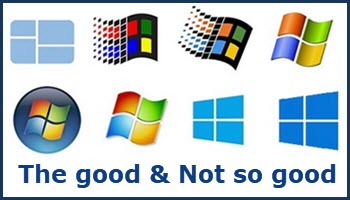I know a lot of our readers are long-time Windows users who have been through the entire gamut of Windows operating systems, as have I. I wonder why it is that these operating systems seem to alternate between good and bad.
Windows XP – Good
Windows XP started life as being one of the worst operating systems in Windows’ history but, following three service packs over almost a decade, it ended up being one of the most cherished operating systems of all time. In the early XP days, I swear I spent more time online looking for solutions to issues than actually achieving anything. However, as I mentioned, XP did end up redeeming itself and, when Vista was released, a common catchcry was… they’ll have to take XP from my cold and dying grasp.
Vista – Bad
Vista was not received well, which is probably an understatement. With Vista, Microsoft decided to introduce an updated graphical user interface including a visual style dubbed “Aero”. Unfortunately, although these new features were aesthetically pleasing, they were also quite heavy on resources.
Vista was released during the beginning of the hardware revolution, a time when hardware specs were comparatively low-end but rapidly improving, and those users who upgraded from XP to Vista on older machines running basic hardware found the new operating system to be slow and unresponsive. Ironically, by the time Vista was due to be retired, hardware specs had caught up with its demand on resources and Vista’s market share actually ended up surpassing Microsoft’s expectations.
I was very lucky as I had just built a brand new machine when Vista was released and had no problems at all running the new operating system.
Windows 7 – Good
Windows 7 was, in my opinion, the best Windows operating system ever. Stable and reliable, it just worked, and worked extremely well. With the last of the traditional Start menus, a fully operational Control Panel, and other traditional UI elements that were so popular, one has to question Microsoft’s later decision to change a lot of those UI elements.
I honestly don’t believe there is much to pick between Windows 7 and Windows 10, but more on that later.
Windows 8/8.1 – Bad
I still remember the very first time I booted up Windows 8, sitting there staring at that blank screen and wondering where the heck to start. Why Microsoft decided to hide the Start button is beyond me. Windows 8 received a lot of criticism over its full-screen Start menu which many pundits described as a “jarring” experience when transitioning between desktop and Start menu, and vice versa. I disagreed with that assessment and did not find it jarring at all. In fact, quite the opposite, I thought the transition was quite seamless.
Regardless, Windows 8 was an unmitigated disaster and Microsoft rather quickly released Windows 8.1 which addressed a lot of the criticisms. I quite liked Windows 8.1 myself and, although neither Windows 8 nor 8.1 will go down in the annals of history as being hugely popular, they did mark the beginning of a new era in enhanced hardware support.
Windows 10 – Good
Windows 10 was initially quite heavily criticized for its additional telemetry (data collection). However, that aspect is now generally accepted and Windows 10 has, in my experience, been a thoroughly reliable and enjoyable operating system – except, of course, for those troublesome updates. It’s mostly the situation with updates that just pushes Windows 7 to the forefront. Otherwise, I believe Windows 7 and 10 are pretty much on par.
Windows 11 – Bad
Windows 11 is the operating system that, according to Microsoft, should never have been. Unfortunately, Windows 11 was rushed out in an incomplete state, as a work-in-progress, and consequently received a lot of criticism for missing or diluted popular features/options. Updates are now addressing a lot of those criticisms but first impressions tend to linger. The irony is, as Windows 11’s ongoing development continues to improve the operating system, we are hearing rumors of an impending Windows 12.
Windows 12 – ???
If the rumors of a Windows 12 become a reality, I believe Windows 12 may represent a departure from the trend. I expect Windows 12 to be largely AI-driven and, knowing users’ reluctance to accept change, I suspect it may not be gracefully received – not at first, anyway.
Will there be a Windows 13? I seriously doubt Microsoft will flirt with that notoriously unlucky number but, with Microsoft, one never knows.
—







Jim. Reminds me of the Star Trek movies where the Even ones were better than than odd.
There is something quirky number wise when sequels (and it seems to apply here to both Windows and some movies), Mindblower!